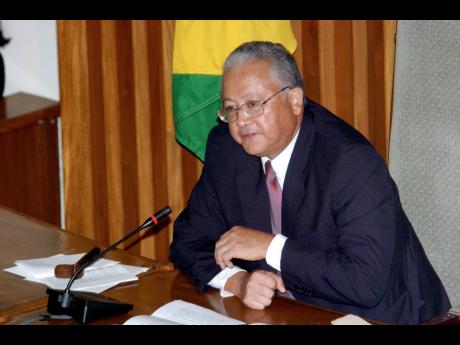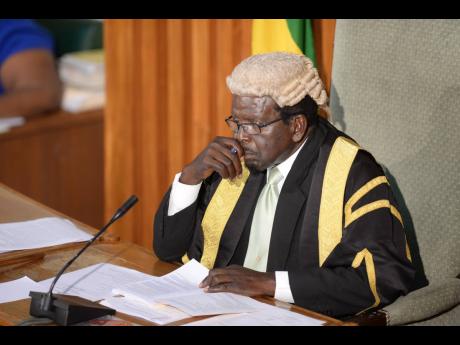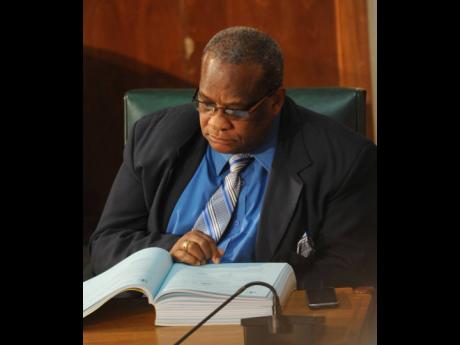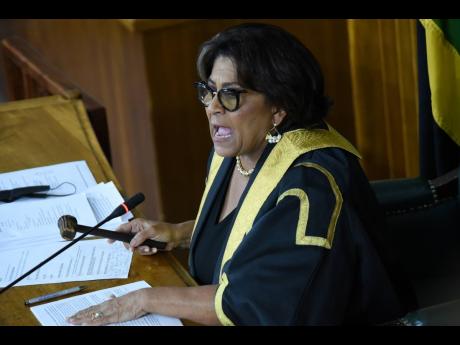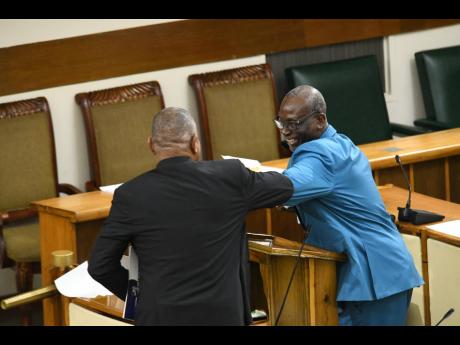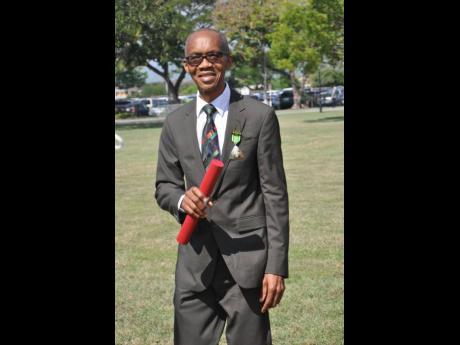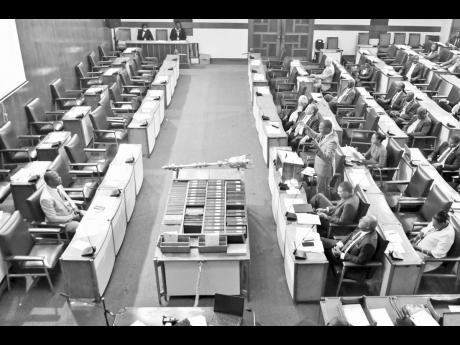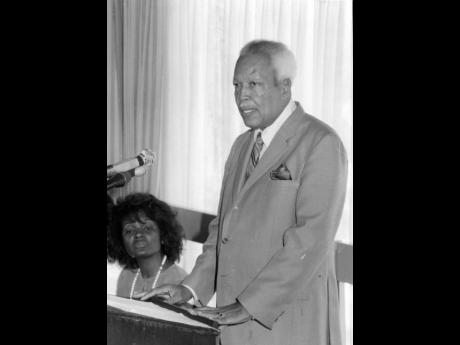Unparliamentary!
• Poll result fears fuelling poor conduct in Parliament, says former deputy Speaker • Past chairs say members lack respect for Speaker of the House
Concerns are being raised that the results of a recent opinion poll showing the two main political parties in a statistical dead heat, are to be blamed for the uptick in what is deemed ‘unparliamentary behaviour’. Midway the Jamaica Labour Party’s...
Concerns are being raised that the results of a recent opinion poll showing the two main political parties in a statistical dead heat, are to be blamed for the uptick in what is deemed ‘unparliamentary behaviour’.
Midway the Jamaica Labour Party’s (JLP) second term in office, former Deputy House Speaker Lloyd B. Smith is saying the campaign to the next election will get worse, and he dreads that families of parliamentarians will get caught up in the hostility of electioneering.
“It is clear that elections are on the way, whether local or general, and I am afraid that if it isn’t cauterised, it is going to get worse and spouses and children of individuals will become engulfed in a sea of ugliness,” Smith, a veteran newspaper publisher and businessman, told The Sunday Gleaner last week.
The former People’s National Party (PNP) member of parliament for St James Central added, “It does not need to happen, and it should not happen. Political name calling should not have made its way into the House.”
Last month’s “Massa Mark” comment and the ensuing heated outbursts in the House ignited the debate once again on the decorum of the representatives of the people and what is considered to be ‘unparliamentary behaviour’, with many going back in history to recall numerous incidents of unseemly behaviour of members of both the Upper and Lower Houses.
Former House Speaker Delroy Chuck explained to The Sunday Gleaner that behaviour deemed to be unparliamentary is not closed-ended.
“The category of such behaviour is not closed and expands regularly. I would say that unparliamentary behaviour is any unseemly way, act or inappropriate utterance that demeans and taints the proceedings of Parliament as recognised and determined by the Speaker,” he said.
According to the guidelines outlined in the Standing Orders of the House of Representatives of Jamaica, 1964, “It shall be out of order to use offensive language about members of either Chamber”. It also called on members to “conduct himself/herself in a fit and proper manner”.
The Standing Orders give the Speaker of the House authority to take action against unbecoming behaviour, noting that “the Speaker or Chairman shall order any member whose conduct is grossly disorderly to withdraw immediately from the House during the remainder of that day’s sitting, and may direct such steps to be taken as are necessary to enforce such order”.
Chuck, the Speaker during JLP’s Bruce Golding’s tenure as prime minister, explained that, “the usual remedy for disorderly conduct is to demand an apology and/or withdrawal of the utterance, naming of the member and, ultimately, suspension of the member for a period. The Speaker’s discretion must be used, and promptly, otherwise there is chaos.”
Asked if the Speaker’s discretion should be removed and stiffer penalties put in place, the justice minister said “No. It’s not possible. The Speaker should, however, have a microphone system that allows him/her to turn off the mic of anyone who fails to adhere to the ruling.”
No respect for speaker
Chuck could not recall hearing any unbecoming utterances during his tenure, but Smith recounted experiencing two of what he considered the worst incidents of unparliamentary behaviour in 2012.
One instance was an expletive-laden tirade of Clifford Everald Warmington, the MP for St Catherine South West, who doused then House Marshal Kevin Williams with bad words when he was asked to remove him from the Chamber after behaviour deemed unparliamentary. He was not removed, and neither did he voluntarily leave.
The other incident was an outburst by JC Hutchinson’s aimed at then MP Raymond Pryce. After a “go siddung” order from Pryce, Hutchinson asked him who he was telling to sit down. During the heated exchange, Hutchinson uttered what was deemed a homophobic slur.
Smith sought to have Hutchinson removed from the Chamber, but the proper procedure was not followed.
The JLP members walked out of the House.
“It is clear that the Opposition members have no respect for the Speaker. It does not have to take spectacles for anyone to see that there needs to be equity in the way the chair operates,” Smith stated.
“The Opposition feels cheated because almost all the time a ruling comes against them and government members get a free hand. When that happens, you have a breakdown. And then chaos ensues.”
He is calling for clear boundaries to be drawn between political and parliamentary obligations in the House, but suggested that “if decency and respect prevail, there will be no need for that”.
Noting that sotto voce remarks are often the ones raising eyebrows, Smith explained that it is not difficult for anyone to hear comments made in the House, unless it is whispered.
The ‘massa mark’ debacle
Two weeks ago when finance minister Dr Nigel Clarke referred to Opposition Leader Mark Golding as “Massa Mark”, House Speaker Marisa Dalrymple Philibert did not ask Clarke to withdraw the remark and St Andrew South West MP Dr Angela Brown Burke rose on a Point of Order when the term was repeated.
She was heckled by a government member who she angrily told to “shut up!” The Speaker told her to withdraw the statement, saying that she did not hear the comment which drew her angry retort. Brown Burke agreed to withdraw, but not on the Speaker’s terms.
Visibly upset over the incident, the Opposition members walked out.
Perceiving the “Massa Mark” comment as likening Golding to a colonial slave master, calls came from various quarters for Clarke to apologise. But in last Tuesday’s sitting of the House, he refused, stating that an apology would legitimise something he did not mean. The House Speaker did not insist on an apology from the finance minister.
‘We pay one another liquor bill’
Memories of the more notable cases of unparliamentary behaviour go back to another expletive-laced tirade by Anthony Spaulding, the late PNP representative from St Andrew South, who was incensed by orders from the then House Speaker Talbert Forrest for the marshal to escort him from the Chamber for unbecoming conduct.
Horace Dalley chuckled when he recalled the time a pen left his hand and ended up near then Opposition Member of Parliament (MP) Derrick Smith.
Last week Dalley explained to The Sunday Gleaner that during a grilling of then National Security Minister KD Knight by Smith, he threw a pen across to him, telling him to “write down the question, because he was asking the same questions for the last three years”.
“I didn’t fling it. I heaved (under armed) it across the aisle. Next thing I heard was that there was a press conference upstairs and Derrick Smith said he had to sidestep it as it was coming for his eyes. Nothing of the sort. But the following week I apologised,” said Dalley, a former PNP MP and government minister.
“But there was no name calling. And everybody tells everybody else to ‘shut your mouth’. Everybody does it.”
It is unfortunate that the public is not privy to the interactions between members from both sides of the aisle outside of the Chamber, he believes.
“We eat from the same canteen. We order food from the same persons, and sometimes sit at the same table. What happens in the Chamber does not happen in the canteen,” Dalley noted.
Late former Prime Minister Hugh Shearer reinforced this point when he told supporters that neither side was an enemy of the other, stating that “we pay one another liquor bill”.
Political performances
Former JLP House Speaker Pearnel Charles Sr agreed with Dalley and Shearer’s comments, explaining that the members were engaged in political performances in the House.
“What you see happening in the House is political behaviour. It is auditioning for elections and for people to see who is doing what. They are all friends, except maybe for a few, but it’s really just politics,” he told The Sunday Gleaner.
Charles could not recall anyone being suspended for breaching House rules but “heard” of a fine being imposed at one point.
He said the Standing Orders give the Speaker the option to name and shame the offending party, and ask for a withdrawal of the comments. Persons can also be ejected from a sitting.
Over the years there have been numerous instances of members shouting over each other and arguing in spite of the Speaker repeatedly banging the gavel and calling for order, another breach of the rules.
“Persons should not be talking when the Speaker is talking. When someone gets up on a Point of Order, the Speaker is obliged to require them to state it. It can be used to clarify and provide additional information, or request the withdrawal of a comment or statement, or bring something to the Speaker’s attention. But there is a clear lack of respect for the Speaker,” Charles said.
The Standing Orders give the Speaker the authority to suspend a member from the House, stating that “If a member shows disregard for the authority of the Chair, or abuses the rules of the House by persistently and wilfully obstructing the business of the House or otherwise, the Speaker shall direct the attention of the House to the incident, mentioning by name the member concerned. The Speaker then shall call upon a minister to move ‘That the member be suspended from the service of the House’.”
Low expectation
Charles and Dalley pointed to several countries in Europe, Asia and Africa where fists, feet, chairs, and other “missiles” were thrown, resulting in many fights during parliamentary proceedings. The United Kingdom’s Parliament is notorious for its verbal acidity, especially during the Prime Minister’s Question Time.
Veteran journalist Franklin McKnight said he was not surprised by recent bouts of unparliamentary behaviour, noting that in his nearly 50 years as a journalist, he has never heard of anyone being suspended for unprofessional conduct in Parliament.
“In general, it has never appeared to me that civilised exchange was something on which a premium was put in the House. That has never occurred to me. I have never felt that the Parliament should be used as any gauge for good behaviour,” he told The Sunday Gleaner.
“I remember someone saying that you can’t tell your children that they should behave like the parliamentarians. And I said ‘that would be a low standard’,” he said Friday.

